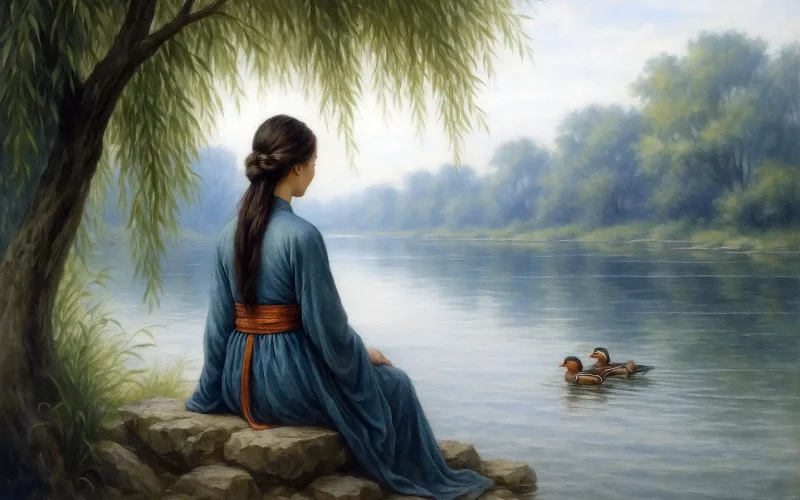Level-Hill's railings lean against the clear sky—
Where mountain hues flicker between being and void.
The willow I planted before the hall:
How many spring winds have passed since we parted?
A scholar-governor of letters,
You wield the brush to write ten thousand words,
And drink a thousand cups in a single bout.
Seek joy while youth remains—
But here before the wine, behold this aging man.
Original Poem
「朝中措 · 送刘仲原甫出守维扬」
欧阳修
平山阑槛倚晴空,山色有无中。
手种堂前垂柳,别来几度春风?
文章太守,挥毫万字,一饮千钟。
行乐直须年少,尊前看取衰翁。
Interpretation
Composed during Emperor Renzong's reign, this lyric was written when Ouyang Xiu bid farewell to his close friend Liu Zhongyuan (Liu Chang) at Pingshan Hall. Originally built during Ouyang's tenure as Yangzhou prefect, the hall stood as a physical manifestation of his political and cultural aspirations. Returning years later to this symbolic site, the poet blends nostalgia for his idealistic youth with admiration for his friend's talents, creating a work of profound sentiment and unconstrained vigor.
First Stanza: "平山阑槛倚晴空,山色有无中。手种堂前垂柳,别来几度春风?"
Píng shān lán jiàn yǐ qíng kōng, shān sè yǒu wú zhōng. Shǒu zhòng táng qián chuí liǔ, bié lái jǐ dù chūn fēng?
Pingshan's railings pierce the cloudless blue,
Where mountain hues dissolve in view.
These willows I planted by the hall—
How many spring winds have passed,
Since we last met them all?
The stanza constructs a spatial-temporal continuum: the hall's verticality ("pierce the cloudless blue") contrasts with the horizontal ambiguity of mountains ("dissolve in view"). The poet's hand-planted willows (手种垂柳) become organic chronometers, their growth measuring elapsed time in "spring winds" (春风)—a subtle metaphor for political seasons changed since his Yangzhou days.
Second Stanza: "文章太守,挥毫万字,一饮千钟。行乐直须年少,尊前看取衰翁。"
Wén zhāng tài shǒu, huī háo wàn zì, yī yǐn qiān zhōng. Xíng lè zhí xū nián shào, zūn qián kàn qǔ shuāi wēng.
This scholar-prefect—
Brushing ten thousand words like flying snow,
Draining a thousand cups in one mighty flow.
"Seize joy while youth persists!"
Yet behold before the wine:
This faded relic of our glorious time.
The titular "scholar-prefect" (文章太守) ambiguously honors both Liu and Ouyang's younger selves. Calligraphic (挥毫) and Bacchic (千钟) hyperboles conjure their shared golden age, while the sudden appearance of the "faded relic" (衰翁) creates poignant self-deprecation—the poet becoming a living monument to vanished vigor, his physical decline underscoring the lyric's celebration of enduring intellectual fellowship.
Holistic Appreciation
This is a quintessential work of the "Heroic and Unconstrained" school, standing out distinctively amidst Ouyang Xiu's usual graceful and restrained style. The poem begins at Pingshan Hall, weaving together mountain vistas, drooping willows, the literary prefect, and the poet's aging self in a seamless and natural flow.
The first stanza paints the scenery while expressing emotion, using "mountain hues" and "drooping willows" to evoke nostalgia and the poignancy of parting—deeply felt yet free of melancholy, with an innate nobility in its spirit. The second stanza shifts from praising a friend to reflecting on the self, employing phrases like "literary talent," "wielding the brush," and "a thousand cups in one toast" to highlight Liu Chang's brilliance and charisma, which in turn mirrors the poet's own aspirations. The concluding self-deprecation blends boldness with a touch of desolation, revealing profound insights into life.
The poem's most distinctive feature lies in its "depth of feeling without sorrow, generosity without affectation." Though it speaks of farewells and the passage of time, there is no grief of separation—only a composed, expansive, and subtly flowing sentiment that leaves the reader uplifted.
Artistic Merits
- Scenery and Emotion Fused, Opening with Grandeur: The poem begins with "Pingshan leaning against the sky," immediately establishing a heroic tone where landscape and emotion intertwine.
- Projecting Feeling onto Objects, Willows as Emotional Vessels: The hall's willows are no ordinary sight but carriers of shared memories, embodying both the flow of time and the poet's reluctance to part.
- Dual Portrayal: Self-Praise and Tribute Combined: The "literary prefect" is both a compliment to the friend and a reflection of the poet's own nostalgia.
- Circular Ending, Self-Mockery with a Hint of Pathos: Calling himself a "decrepit old man" acknowledges aging without lament, instead showcasing a serene and transcendent outlook on life.
Insights
Though framed as a farewell poem, this work transcends mere sorrow at parting, embedding philosophical musings within its heroic tone. It teaches us that life's encounters—joys and sorrows, meetings and separations—can be transformed into a majestic ode when met with an open heart and indomitable spirit. At Pingshan Hall, beneath the willows, Ouyang Xiu bids farewell not only to his departing friend but also to the vigor of his youth. Yet it is precisely this composed wisdom and magnanimity that endows the poem with its most moving power.
About the Poet

Ouyang Xiu (欧阳修, 1007 - 1072), a native of Yongfeng, Jizhou (present-day Jiangxi Province), emerged as the preeminent literary figure of the Northern Song Dynasty. After attaining the jinshi degree in 1030, he spearheaded a literary reform movement that rejected the ornate Xikun style prevalent at court. As a mentor who nurtured literary giants like Su Shi and Zeng Gong, he laid the foundation for the golden age of Northern Song literature. Recognized as one of the "Eight Great Prose Masters of Tang and Song," Ouyang stands as the pivotal figure in the transformation of Northern Song literary culture.












